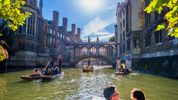Chattanooga, Tennessee, has achieved a remarkable transformation by becoming North America's first National Park City. Once labeled the most polluted city in the U.S. in 1969, Chattanooga has redefined its identity through community-driven environmental revitalization.
This prestigious designation, awarded by the U.K.-based National Park City Foundation, recognizes Chattanooga's commitment to creating a greener, healthier, and more sustainable urban environment. The city boasts over 70 parks and 35 miles of trails, offering residents and visitors ample opportunities to connect with nature. Initiatives like the South Chickamauga Creek Greenway and the Tennessee Riverwalk exemplify Chattanooga's dedication to accessible green spaces.
The journey to this recognition involved a collaborative effort, with over 5,600 residents signing a charter and the submission of a comprehensive "Journey Book" detailing the city's environmental and cultural initiatives. Mayor Tim Kelly encapsulated the city's vision by encouraging citizens to view Chattanooga as "a city in a park, rather than a city with some parks in it."
Chattanooga's transformation serves as an inspiring model for urban renewal, demonstrating how cities can harmonize development with environmental stewardship and community engagement.
Chattanooga has recently made history as the first National Park City in North America, a title that celebrates its commitment to urban nature and sustainable living. This designation brings Chattanooga’s nature and city life closer together than ever before.
 unknownx500
unknownx500
















